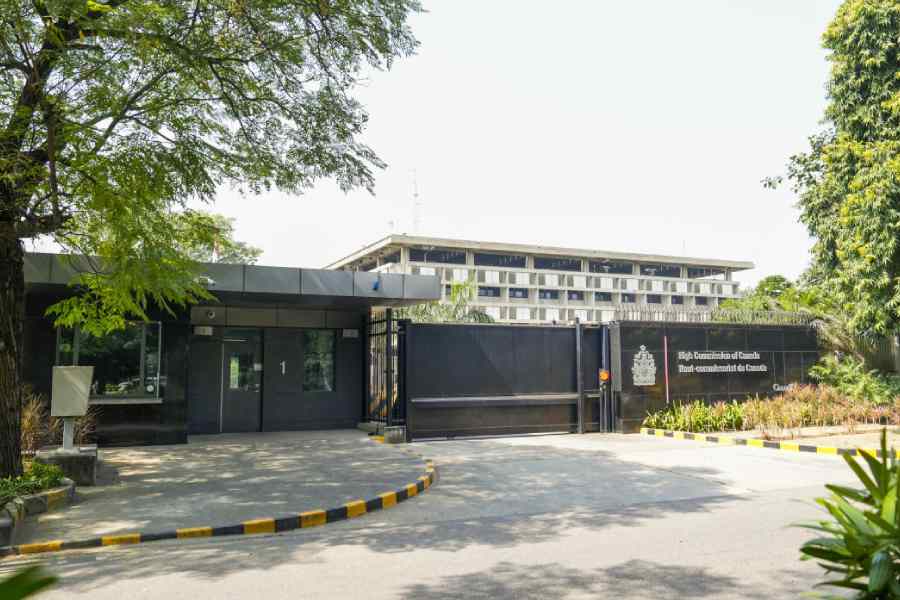Canada on Monday said the expulsion of six Indian diplomats, including the high commissioner, was necessary to “disrupt and dismantle an organised criminal enterprise that represented a threat to the public safety of Canadians”.
Canada alleged a connection between Indian government agents and gangster Lawrence Bishnoi, who is accused of running a crime racket from Sabarmati jail, while not ruling out the demand for imposing sanctions on India.
The need to disrupt and dismantle the network was a recurrent statement that came out of multiple offices in Canada — the Prime Minister’s Office, foreign ministry, ministry of public safety and the Royal Canadian Mounted Police (the country’s national police) — through the day after diplomatic relations with India hit rock bottom following reciprocal expulsion of diplomats from both countries on Monday against the backdrop of Ottawa naming six Indian diplomats as “persons of interest” in the murder of Khalistani activist Hardeep Singh Nijjar.
India did not officially respond to any of the remarks made in a series of media conferences in Ottawa but sources on Tuesday maintained that there was no truth in the Canadian contention that “credible evidence has been presented” to New Delhi.
“This is simply not true. From the very beginning, the Canadian approach has been to make vague accusations and put the burden of denial on India,” one of the sources said.
As was the case last year, Canadian Prime Minister Justin Trudeau led the charge, briefing the media along with foreign minister Melanie Joly and public safety minister Dominic Leblanc. “As the commissioner of the RCMP (Royal Canadian Mounted Police), Mike Duheme, stated earlier today, the RCMP has clear and compelling evidence that agents of the Government of India have engaged in, and continue to engage in, activities that pose a significant threat to public safety,” Trudeau said at a media briefing.
Trudeau added: “This includes clandestine information-gathering techniques, coercive behaviour targeting South Asian Canadians, and involvement in over a dozen threatening and violent acts, including murder. This is unacceptable.”
Stating that India repeatedly refused to work with the RCMP and Canadian national security officials, Trudeau added: “That is why, this weekend, Canadian officials took an extraordinary step. They met with Indian officials to share RCMP evidence, which concluded six agents of the Government of India are persons of interest in criminal activities.”
Joly stated that “India was asked to waive diplomatic and consular immunities” to the six individuals so that the RCMP could interview them. “Regrettably, as India did not agree and given the ongoing public safety concerns for Canadians, Canada served notices of expulsion to these individuals. Subsequent to those notices, India announced it would withdraw its officials,” she said, providing the Canadian version of Monday’s sequence of fast-moving events.
The Canadian government has made it clear that the six Indian diplomats who have been issued deportation notices can no longer act in their diplomatic capacity in Canada nor re-enter the country.
Asked if Canada would be willing to accept other Indian diplomats in their place, Joly said, “We don’t want diplomatic confrontation with India”, acknowledging the people-to-people ties.
“We want to make sure people-to-people ties are possible,” she said, adding that all Canada is asking for is that India cooperate with Ottawa the way it is cooperating with the US over similar allegations by the FBI about an Indian government hand in a plot to assassinate Khalistani activist Gurpatwant Singh Pannun of Sikhs for Justice.
Trudeau and his ministers repeatedly refused to provide details on how many murders had been committed by this so-called network and also the time period when all this happened, maintaining that the matter was in court and they did not want to say anything more than what the RCMP had in its statement.
On the demand of the New Democratic Party to impose sanctions on India, Joly said all options were on the table. “Today was a very important step…. When you look at what is available, expulsing is one of the toughest measures a country can take under the Vienna Convention (the international treaty that defines a framework for diplomatic relations between independent countries).”
Stating that Canada will continue with efforts to get India to cooperate, she added that Ottawa will engage with its partners in the Five Eyes — the Anglosphere intelligence alliance of Australia, New Zealand, the US, the UK and Canada — and the G7. “Everything is on the table,” she added.
Earlier, at the RCMP briefing, assistant commissioner Brigitte Gauvin said: “What we’ve seen from an RCMP perspective is the use of organised crime elements… and it’s been publicly attributed and claimed by one organised crime group in particular, which is the Bishnoi group… and we believe that that group is connected to agents of the Government of India.”
About these assertions made at the RCMP media briefing, a source in New Delhi said: “In no case were any specifics provided. There was also talk about holding people accountable.”
Canada has already reached out to partner countries in the Five Eyes. Last year, when Trudeau first informed the House of Commons of an “Indian hand” in the killing of Khalistani activist Nijjar in British Columbia, western capitals had indicated that he had made this statement on the basis of information shared within the Five Eyes intel network.
Trudeau has spoken to British Prime Minister Keith Starmer and both have stressed the rule of law.
New Zealand foreign minister Winston Peters said his country had been briefed by Canada about the ongoing criminal investigations.

